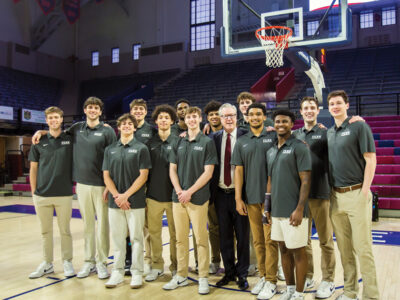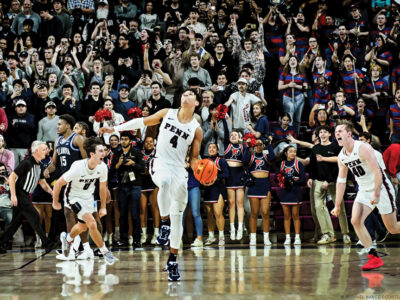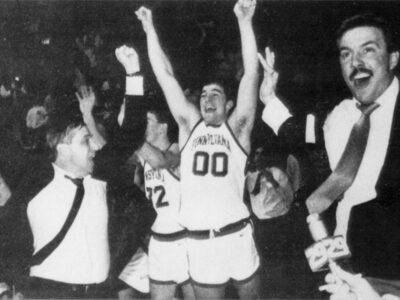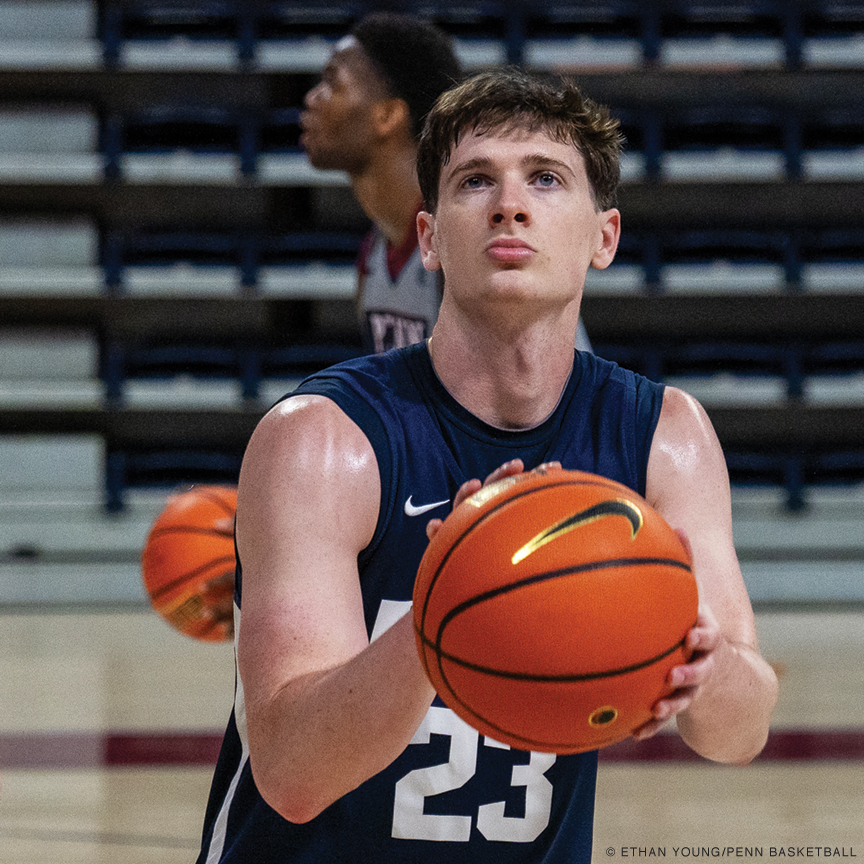
In a new college basketball world, the Quakers might live and die by the players transferring in and out of the program.
Ethan Roberts is not your typical Penn basketball newcomer. Then again, this is not your typical Penn men’s basketball team.
Roberts grew up in Memphis, played high school ball outside of Chicago, went to West Point to play for Army, transferred to Drake University in Iowa, and is now in University City, where he’s poised to have a key role for a revamped 2024–25 Quakers squad featuring three transfers and seven total newcomers.
“There’s a new excitement,” Roberts said after an October practice. “I think we’re bringing a new bit of life.”
Though Penn head coach Steve Donahue has said in the past that he believes major personnel overhauls are not the best way to achieve success, his hand was forced in a lot of ways this year. Shortly after the 2023–24 season ended, Tyler Perkins announced his departure from Penn following a standout freshman campaign—a huge blow for a program that had also lost its best player from the prior season, Jordan Dingle, to the transfer portal. And similar to last year when Max Martz opted to forego his final season at Penn, senior Eddie Holland did the same this fall, deciding to leave the program while remaining at Penn to get his degree in May. Holland, who averaged 5.8 points per game last season, plans to use his final year of NCAA eligibility as a grad transfer elsewhere in 2025–26.
After having been blindsided by the sudden Dingle and Martz departures, which contributed to an 11–18 overall record and 3–11 mark in the Ivies last year, Donahue “determined during the [2023–24] season that we were going to go for transfers,” the coach said. “It’s a different type of recruitment. In some ways, I like it because they know what this place can do for them. They’ve been somewhere else, and now they really value this probably more than a freshman.”
Perkins’s decision to transfer out of Penn—even worse, to Big 5 rival Villanova, a team he helped the Quakers upset last season—may have felt like the sky falling for Quaker faithful. But other Ivy stars made similar moves. Yale’s Danny Wolf departed for the University of Michigan and Harvard’s Malik Mack transferred to Georgetown, showing that retention may be a league-wide issue in a shifting college basketball landscape that now allows players to chase NIL (name, image, and likeness) money and national exposure at higher-profile basketball programs without having to sit out a year (as previous NCAA transfer rules dictated).
Yet Donahue believes that the Ivy League should remain a top 12 conference, given that most other mid-major squads lose more players to the transfer portal than Ancient Eight teams do. And it’s possible that the Quakers may benefit from this new college basketball world, as Penn tapped into the portal more aggressively than any of their Ivy counterparts with the additions of Michael Zanoni (Mercer University) and Dylan Williams (Triton College) in addition to Roberts.
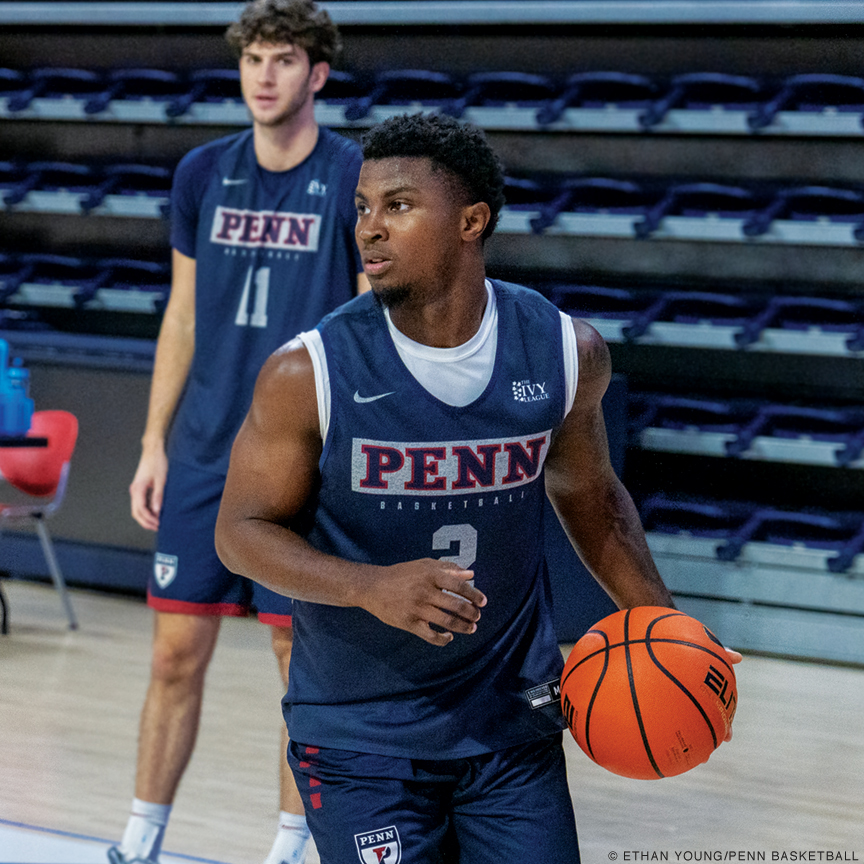
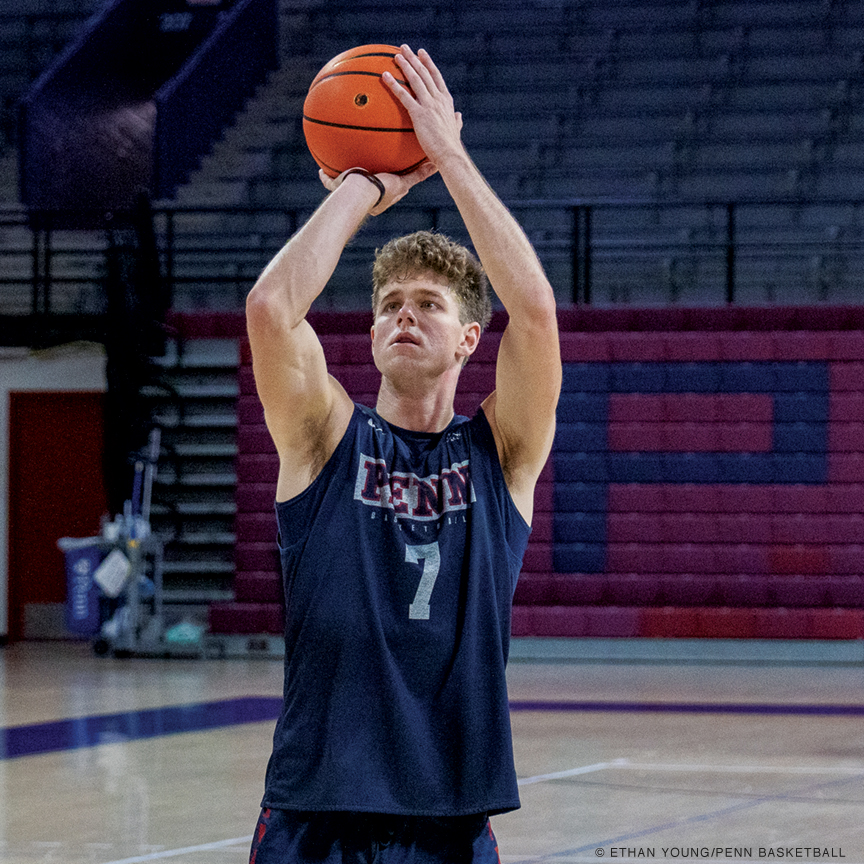
From left: Dylan Williams and Michael Zanoni.
Donahue now hopes those three junior transfers can help make up for the program’s recent losses and maintain a veteran presence in the locker room and on the court. “It’s a whole different vibe,” the head coach said. “And we’re motivated more than ever to get this right and have a great season.”
Donahue praised assistant coaches Nat Graham C’97, Joe Mihalich Jr., and Kris Saulny for sifting through many resumes to find players likeliest to be the right “cultural fit and basketball fit,” while having the academic capacity to cut it in the Ivy League. He also credited administrators for not only sharing the “vision of how to build us back up” but helping with the “collaborative effort” of integrating the new student-athletes through the transfer of credits, enrollment in summer classes, and more. Donahue said other Ivy schools didn’t go down the same path, in part because Penn is bigger and “I think the depth and breadth of our curriculum allows for more transfer credits.” And although he admitted that he doesn’t “want to do this every year,” he noted that several championship-winning Penn teams have been fueled by transfers—from Perry Bromwell C’87, to Matt Maloney C’95 and Ira Bowman W’96, to Andy Toole C’03 and, most recently, Caleb Wood C’18. “I think it’s something we embrace,” Donahue said. “We’ve just got to make sure it’s the right guys.”
Whether or not Roberts, Zanoni, and Williams prove to be the “the right guys,” they’ve all shown how much they want to be at Penn since arriving on campus. “All three got offered money somewhere else,” Donahue said. “So to me, it was kind of refreshing because everyone talks about the NIL money, and here are three kids that were in those experiences, had chances to go other places and make money, and they still see the value of what Penn has—basketball, academics, and what it does for their life.”
All three have had interesting journeys, too. Zanoni—a Charlotte, North Carolina, native who was the only one of the trio on Penn’s radar in high school—is a sharpshooter who had a productive freshman season at Mercer before missing almost all of his sophomore season with an injury. Williams, a diminutive point guard from South Carolina, played the last two seasons at junior colleges and last year led Triton to the National Junior College Athletic Association national championship game. And Roberts was the Patriot League Rookie of the Year at Army, but never played a game for Drake because of an undisclosed medical issue (which he said is completely behind him).
“In a weird way, that’s a fun part of transfers, because they bring a different story to your program,” Donahue said. “And guys get to learn from them, about their experiences.”’
Roberts was thrilled when Penn reached out to him and hopes this will be the last stop on his circuitous college basketball journey. Although he loved his time at West Point—and he had a big-time rookie season, averaging 12.4 points and 4.4 rebounds per game while shooting 40.7 percent from beyond the arc—he realized he’d rather pursue professional basketball after college than serve in the US Army. He then chose Drake for its excellent basketball program—the team has been to the NCAA tournament three of the last four years—but “I went there just for basketball, that’s it,” he said. “You go to Penn for everything. I’m so proud to be here. I’m proud to be a student at Penn.” Both his coaches at Army and Drake also left at the end of his seasons there, which pushed Roberts to follow them out.
Roberts said he and his fellow transfers have meshed well and are like-minded in their hunger to bring Penn to the top of the Ivy League. He’s also friends with senior guard Reese McMullen, who he knew in Memphis, which has helped with his transition to Penn. And he’s been impressed with Penn’s other seniors, including center Nick Spinoso, whom he called such a “good passer.” Spinoso was tied for fourth in the league with 107 assists last season while averaging 10.8 points (19th in the league) and 7.9 rebounds (fourth in the league) per game.
“We’ve got high hopes,” Roberts said. “We’re hungry.”
Although Penn was picked seventh in the preseason Ivy League poll, Roberts insisted that “we’re gonna shock people.” Donahue, too, expects Penn to compete for a conference championship, calling his team a “wild card” because of the transfers bolstering a group that also returns sophomores Sam Brown (one of Penn’s’ top players as a freshman last season) and Augie Gerhart, a 6-foot-9 forward who the coach noted “has really jumped out” and is ready to become “a really good player in this league.” Unlike last year, Donahue also believes he can ease in the freshmen rather than being forced to throw them right into the rotation.
“My expectation,” the head coach said, “is that we will be a really good team.” —DZ


